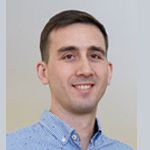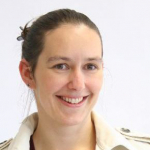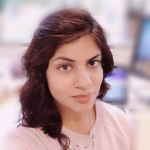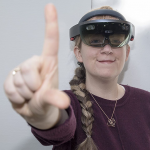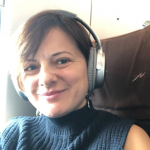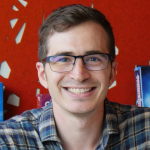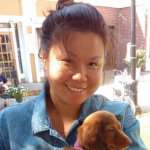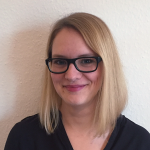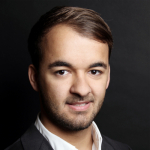Author- and Game Agency in Narrative Digital Game-Based Learning |
||||||||||
|---|---|---|---|---|---|---|---|---|---|---|
Instructional theory has shown narratives to be superior to expository description in fostering learning. Narratives have been suggested to be easier to remember than other instructional materials, as well as to both engage and motivate learners. Reviews of Digital Game-Based Learning (DGBL) point to positive effects on engagement, motivation, and learning. DGBL has been shown to amplify the learning situation and to extend it by offering new learning means and venues.
|
How the Blockchain can shape the future of education |
||||||||||
|---|---|---|---|---|---|---|---|---|---|---|
The emergence of Blockchain technology promises to revolutionise not only the financial world, but also education in many different ways. Blockchain technology offers opportunities to thoroughly rethink how we find educational content and training services online, how we register and pay for educational content and training services, as well as how we get accredited for what we have learned and how this accreditation affects our career trajectory. This workshop will explore the different aspects of teaching and learning that are affected by this new paradigm. In particular, we will investigate the different scenarios that place the learner at the very centre of the learning process and its associated data via the use of Blockchain technology. More specifically, we will outline the ways that ePortfolios, accreditation, tutoring, as well as other aspects of teaching and learning can evolve within a learner-centred ecosystem based on the Blockchain. Finally, we will discuss the various benefits that this ecosystem ears for teachers and learners.
|
Big Data in TEL |
||||||||||
|---|---|---|---|---|---|---|---|---|---|---|
The successful outcome of a TEL system depends among other things on the ability to decide which software infrastructure is necessary. Diverse concepts can be found in the domain. Selecting an appropriate solution is not straight forward. In this workshop, an introduction on up to date Big Data technologies and architectures will be given. This introduction will make the participant aware of the potential but also understand the constraints. An exchange of information on the currently used infrastructures by the participants and the community will provide the group with an overview of the state of the art. This overview will be the base of a discussion about the potential use cases of Big Data in TEL.
|
Reflection Guidance – State-of-the-art and Challenges in Intelligent mentoring systems |
||||||||||
|---|---|---|---|---|---|---|---|---|---|---|
Adaptive reflection guidance can be understood as a specific kind of intelligent tutoring systems – as a kind of intelligent mentoring systems, as envisaged by Dimitrova (2006). These systems don’t encode to a very fine-granular degree domain knowledge, and learning strategies, but support the learner in developing the capability to learn in a self-directed manner; and in to learn about a particular learning domain. In this lecture and demo, I will show a concrete modular in-app reflection guidance framework, and its instantiation in different research prototypes (Fessl et al., 2017). I will also discuss how such a system relates to the very wide fields of intelligent tutoring systems and adaptive and context-aware systems in general; inheriting open challenges from each of these fields. In particular, it connects to promising fields of future TEL research in finding the sweet spot between human and artificial intelligence.
|
Expertise Modelling using Augmented Reality and sensors for training |
||||||||||
|---|---|---|---|---|---|---|---|---|---|---|
Have you ever attended a seminar or a workshop from one of the experts in your field, expecting to learn what he knows or has to share, only to realize at the end that you are more confused and didn’t really have a lot to
|
Rites of passage: Creating Impactful Scenarios for the Transition in Between Realities in Mixed-Reality |
||||||||||
|---|---|---|---|---|---|---|---|---|---|---|
A majority of virtual (learning) experiences confronts users with a sudden switch from actual reality to virtuality, thus neglecting the moment of transition and the space in between as design opportunity. Mixed Reality technologies however, and the experiences created from them demand for an exploitation of this particular moment of transition that might eventually act as a facilitator to furthering and prolonging desired learning effects in both mobile and stationary experiences. By presenting findings from the creation of our Porta Praetoria MR Smartphone App2, workshop participants will be introduced to chances and challenges of designing inner-diegetic transition scenarios within the reality-virtuality-continuum (P. Milgram and A. F. Kishino, 1994). Drawing on the anthropological three-stage model of the “rites of passage” (van Gennep, 1977) and adopting it with the means of technology as well as the medium’s key affordances: “theme/story”, “environment”, “interaction” and “embodiment”, participants will develop a series of design considerations as first steps towards a methodology for creating powerful entry-, exit- and transition scenarios.
|
Ideation and Design of Learning Games |
||||||||||
|---|---|---|---|---|---|---|---|---|---|---|
Game-based learning (GBL) offers innovative and engaging ways to educate learners. Researchers need a standardized method for ideation and design of these type of games. Learning games require a multidisciplinary approach that combines game design, interaction design and instructional design. The objective is to bring together participants with different background to come up with ideas and design a learning game in a heterogeneous team. This workshop will use LEAGUE toolkit for ideation and design of learning games based on LEAGUE Game-based learning framework. We will start by providing knowledge about game-based learning and then introducing the toolkit activity. We will present a small demo to describe the different cards, board, playbook and setup to illustrate how participants will use the toolkit during the workshop’s ideation and design activity session. In the ideation and design session, participants will be asked to work in teams to come up with an early prototype design for a learning game using the toolkit. To focus the ideas, we will use some themes and scenarios. By the end of the session, the teams will have created early stage game design document with simple prototypes that can be demonstrated at the end of workshop. The workshop is open to everyone to attend with any level of experience. No prior experience is required.
|
Immersive TEL in Higher Education: integration challenge |
||||||||||
|---|---|---|---|---|---|---|---|---|---|---|
Digitalization and digital competencies are going to play increasingly important role in pedagogical practice. Immersive technologies, such as Virtual Reality, Augmented Reality and Mixed Reality, are becoming an important part of the technological toolkit of teachers and trainers. The interest in the teacher community for applying these technologies is very high. However, the teachers are lacking the necessary competences for using existing immersive-tech Open Educational Resources, adapting them to the curricula and designing own resources. Therefore, the main objective of this workshop is to brainstorm methods, procedures and recommendations for competence development of applying immersive technologies in higher education settings, such as classroom or lab.
|
The Trialogical Approach: learning through shared objects and technologies |
||||||||||
|---|---|---|---|---|---|---|---|---|---|---|
In the current society, educational systems play a central role in the direction of promoting responsible and competent citizens. To reach this goal, students should be enabled to acquire and develop the so-called knowledge work skills: individual (e.g., metacognitive skills and ICT skills), social (e.g., networking and communications) and epistemic (e.g., critical thinking, information management). Equipped whit those skills students should become able to act in constantly changing situations, in an uncertain world and unknown future, facing incomplete and imperfect results (Biesta 2009; Johansson, Kopciwicz, and Dahlgren 2008), and carrying on a reflexive attitude oriented towards a long-life learning (Delors 1997). Supporting the development of knowledge work skills implies the need for educational agencies to review curricula and pedagogical practices, as also highlighted by the international community (OECD 2013). The purpose of this workshop is to present a theoretical approach able to meet these indications: the Trialogic Approach (TLA) (Paavola &Hakkareinen, 2005). TLA integrates and combines three elements: the monological approach (centered on the processes of individual knowledge), the dialogical approach (centered on distributed cognition and social interactions), and the knowledge creation metaphor (centered on the production of shared artefacts, whish are useful to the community). Trialogic activities allow students to increase their skills, competences and knowledge, while developing or improving concrete artefacts, combining individual and collective goals. Within the TLA, technologies mediate the process of reification and the improvement of ideas and are chosen in order to guarantee real collaboration and interdependence. After having illustrated TLA theoretical implications and design principles, participants will be asked to concretely apply and experience them through a small-group activity: supported by devices and applications, each group should produce a shared artifact, following TLA indications. Finally, a plenary discussion will focus on the processes and outputs of the activity.
|
Multimodal Tutor |
||||||||||
|---|---|---|---|---|---|---|---|---|---|---|
Human anatomy and cognitive abilities have developed through physical interactions with objects and with other living creatures. Experiences that involve multiple senses, such as touch, smell, visuals, sounds or flavours, are inevitably more meaningful and authentic for the learner. The idea of ‘multimodality’ consists of segmenting and analysing the interaction of learners with the physical world. Today it is possible to capture fine-grained traces of the learning process with wearable sensors, Internet of Things devices and high-frequency data collection technologies, that we call ‘multimodal data’. Through signal processing, machine learning and experience sampling it is possible to use multimodal data to tailor personalised multisensorial feedback. Such feedback could steer the learner to optimise learning goals attainment or skills acquisition.
|
Learning analytics design in game-based learning |
||||||||||
|---|---|---|---|---|---|---|---|---|---|---|
Digital games are an integral part of the younger generations and they spend a lot of time playing games in- and out-of-school. These systems can generate rich data which can be used to make inferences about what and how students are learning. Many of the constructs that can be measured in games are potentially very hard to grasp by teachers using traditional assessment methods. Therefore, learning analytics holds the potential to unlock valuable information of numerous student’s abilities connected to lifelong learning, such as creativity, productive struggle, persistence, and experimentation. However, the intrinsic multidisciplinary nature of learning games, together their frequent open-ended environments, can make very challenging to design games that can actually be used to make valid and actionable inferences through learning analytics. In this workshop we will provide an overview of the topic and of our design process, and then we will have participants practice how to design learning games and data infrastructure that can be aligned to conduct learning analytics research.
|
Creating Storified Online Courses |
||||||||||
|---|---|---|---|---|---|---|---|---|---|---|
As a teacher it can be hard to create compelling educational online courses. Often, educators of such courses have lots of expert knowledge but comparingly few pedagogical expertise. Learning materials are interesting, but rarely connected to each other and often not adapted to the students’ needs. Narratives can help structuring course materials while making them more interesting and easier to understand for the learners. It can not only help to improve lectures but also exercises.
|
Portable co-located collaboration support in real-time |
||||||||||
|---|---|---|---|---|---|---|---|---|---|---|
Collaboration is an important skill in the 21st Century. It can take place in co-located or remote settings in different scenarios like programming, problem solving, project meetings, etc. Audio is the ubiquitous modality during Co-located Collaboration (CC) in most of these scenarios. Previously, many works have used multiple non-lexical audio features like total speaking time, pitch, synchrony of amplitude, number of interruptions to detect the quality of CC. But, none of these studies have tackled the problem of giving an automated real-time feedback to facilitate collaboration in real-time. A few studies have gone to the extent of using human moderators to detect the quality of CC and made a provision for giving a human-driven real-time feedback while most have focused on post-hoc detection of the collaboration quality.
|
Introduction to Constructionism and Learning-by-Making |
||||||||||
|---|---|---|---|---|---|---|---|---|---|---|
The learning and instruction theory of constructionism has been developed to extend the constructivist learning paradigm by adding physicality to the knowledge construction. Seymour Papert, the theory author, pioneered and led the educational efforts of motivating children to experiment, design, create, and explore the world around them by using technology. He argued that the best learning occurs through creation of tangible and sharable artefacts. The creation of such artefacts nowadays predominantly happens with support of one or another technological tool. The focus of this workshop is on introduction to constructionism and its application in everyday educational practices. Participants will learn the theory background and its main concepts, such as what constitutes “learning by making”, what role technology plays in this pedagogy, and what kind of artefact creation could be introduced into a particular curriculum.
|
OurTown |
||||||||||
|---|---|---|---|---|---|---|---|---|---|---|
OurTown is a mobile application being developed with support from the Erasmus+ programme designed to link learning in the school with learning in the community. OurTown is based on learning challenges grouped into learning trails in local communities, including shops, businesses, parks and museums. Challenges can be developed around different subjects, e.g. science, history, ecology, around careers or just about the local community. The trails and challenges are accessed through QR codes by learners through a mobile app. They are developed by teachers or by members of community organisations and attached to the codes using a computer application.
|
Introductory Epistemic Network Analysis Workshop |
||||||||||
|---|---|---|---|---|---|---|---|---|---|---|
Epistemic Network Analysis (ENA) is an innovative method for modeling and comparing the structure of connections between elements in coded data. ENA both visualizes data as networks and enables a statistical comparison of the networks. ENA has been used to explore the communication patterns of trauma teams, to analyze the eye-tracking data during collaborative learning, and to visualize competencies and topics across grades in a mathematics curriculum, just to name a few examples.
For the workshop you just need to bring your laptop and have an Internet connection. The datasets and other materials will be sent per email before the workshop; please download these onto your laptop.
|
Designing Learning Activities for Ubiquitous Digital Devices |
||||||||||
|---|---|---|---|---|---|---|---|---|---|---|
The utilization of Massive Open Online Courses is omnipresent in today’s world. The provided learning material can often be accessed by desktop computer, notebooks, tablets, and smartphones in order to offer freedom in the learners’ own learning process. Furthermore, modern digital devices, like smart TVs, smart speakers, and smartwatches, receive increased acceptance as they continue to improve our daily routines through convenience functionality. Whereas the use of tablets and smartphones for learning activities become more and more established, research and applications that incorporate these new devices do not exist.
|
Am I planning smart? – Exploring learning cycles |
||||||||||
|---|---|---|---|---|---|---|---|---|---|---|
Setting meaningful goals is an important part of self-regulated learning (SRL). Learning goals are used for learning planning and enable learners to draw conclusions from the learning process. Formulating goals is not a straightforward task, which is why we present a smart learning goal guideline. The workshop will start exposing and discussing the opportunities of SRL. Then it will continue with a set of exercises where participants will formulate their own meaningful SRL goals.
|
Culturally sensitive learning analytics tools |
||||||||||
|---|---|---|---|---|---|---|---|---|---|---|
Learning Analytics (LA) has gained a lot of attention in the last years as more and more data about learners and their contexts became available. Thus, the number of LA tools has been steadily on the rise, but the majority of them follow the ‘one size fits all’ paradigm, deploying the same tool to all its users regardless of their individual differences. Among other personal characteristics like age, gender, level of education or skills, it has been shown that cultural differences can influence learning and teaching in traditional classrooms as well as in an online environment.
|
Learn to fight irrational fears with data driven approaches |
||||||||||
|---|---|---|---|---|---|---|---|---|---|---|
Individual fears and feelings or perceptions of unsafety do not always match the real safety situation (Cho et al, 2009). Fears may lead to irrational decisions and behaviour, such as avoiding certain places at certain times,
|


